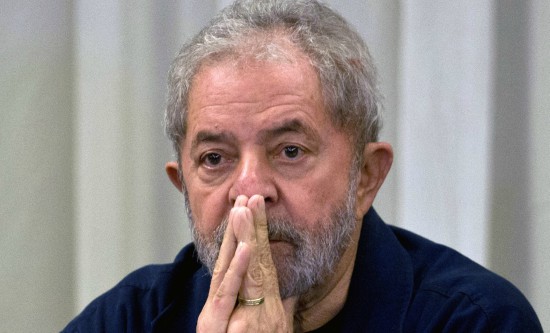
Former president of Brazil, Luiz Inácio Lula da Silva, also known simply as Lula
On Wednesday 24 January a Federal appeals court upheld the conviction of former president Luiz Inácio Lula da Silva on corruption charges – on the word of a construction company executive engaged in plea bargaining over his own corrupt practices. That this trial is the result of machinations by corrupt establishment politicians is undoubtable, and started when they manoeuvred to expel Dilma Rousseff as president in 2016.
The case is astonishing. The panel increased his prison sentence to 12 years and one month from nine and a half years. Lula will now appeal to a higher court. He holds a commanding lead in every poll for the presidential election later this year despite the trial and initial conviction. His absence would leave the road open to the deeply reactionary Jair Bolsonaro of the Progressive Party – he openly defends the brutal military dictatorship that lasted from 1964 to 1985.
Lula was accused of accepting a gift of a $600,000 (though the figure has now changed to $1.1m) coastal apartment in Guarujá, southeast São Paulo, from construction company OAS. Lula visited the building once to view it. This company received many large and illegal contracts from the federal government while Lula was president. The OAS executive testifying for the prosecution claims the apartment was remodelled for Lula and alleges Lula steered the company to deals with Petrobras, the state-controlled oil company.
However, the apartment’s title was never transferred to Lula or his associates; he and his wife never used the property. The prosecution could not identify an explicit quid pro quo or benefit related to Petrobras; no official or internal documentation linking Lula to the apartment was produced; and the case rests almost entirely on the testimony of the executive who hoped to gain sentencing leniency on corruption charges for his cooperation. Both the indictment and the rulings are clearly flawed.
The lead investigator, judge Moro, is responsible for investigations into the multiple ‘car wash’ scandal, exposing corruption in all the major parties. However, only Lula’s party, the Workers Party (PT), has been politically decapitated by these investigations. Moro had previously illegally released tapes of conversations between Lula and his lawyers and the then PT President Dilma Rousseff, which were promptly presented in the press in a manner to discredit them both. Rousseff was expelled from office in 2016. Moro apologised but then had Lula seized for questioning in another manoeuvre that allowed the millionaire press to blacken his name. The leaders of other parties – including current president Michel Temer of the Brazilian Democratic Movement (MDB) – remain in power in the face of overwhelming evidence that exposes their extreme corruption. The conclusions are obvious.
The judicial system is one of ruling class justice. The judicial elite wield great power, with huge salaries, while running private businesses. If caught committing serious crimes they are simply retired on a full pension. The president of the triumvirate that ruled against Lula on 24 January had declared the initial trial result ‘irreproachable’ before admitting he had not read the evidence, and another of the three is a very close friend of Moro. Lula’s candidacy could be blocked before the coming October election. Even if he does stand and win, Lula could be subsequently removed from office by the same judiciary. It is clearer every day that only a revolution that removes the rotten carcass of the comprador bourgeoisie in Brazil for good can end the continued misery of the Brazilian masses.




